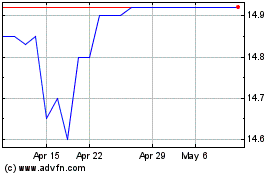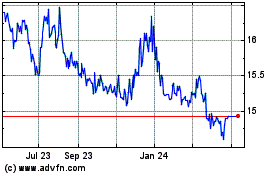Toshiba Taps Foreigners for Board -- WSJ
May 14 2019 - 3:02AM
Dow Jones News
By Kosaku Narioka
This article is being republished as part of our daily
reproduction of WSJ.com articles that also appeared in the U.S.
print edition of The Wall Street Journal (May 14, 2019).
TOKYO -- Toshiba Corp. said it would put international investors
on its board including one with ties to a U.S. hedge fund that
holds a Toshiba stake, the latest sign of activist shareholders
wielding their clout in Japan.
Toshiba, which has roots dating to 1875 and long stood as one of
the most prominent names in Japanese business, said it was the
first time in nearly 80 years that a non-Japanese person would
serve on its board.
The decision followed pressure from several U.S. and Asia-based
investors that took top stakes in Toshiba after a series of
troubles at the company, including an accounting scandal that
unfolded in 2015 and the bankruptcy of its former U.S. nuclear
subsidiary, Westinghouse Electric Co.
King Street Capital Management, which has a 5.4% stake in
Toshiba, has said the Japanese company may have to sell
nonperforming businesses. King Street had said it wanted a
co-founder of the New York-based hedge fund, Brian Higgins, on
Toshiba's board.
Toshiba declined to nominate Mr. Higgins to its 12-member board,
but it did name George Raymond Zage III, a former vice president in
Singapore for Goldman Sachs Group Inc. Mr. Zage previously led an
Asian affiliate of San Francisco-based Farallon Capital Management;
Farallon owned a 5.4% stake in Toshiba as of June 2018, according
to a regulatory filing.
Toshiba Chief Executive Nobuaki Kurumatani said that in
selecting the board slate -- including seven new
independent-director candidates, he recognized that about 70% of
Toshiba's shareholders are now non-Japanese. "We always kept a
channel of dialogue open and spoke fairly actively with them," he
said.
Others with overseas connections nominated to the Toshiba board
include Jerry Black, former chief executive of management
consulting firm Kurt Salmon, which is now part of Accenture; Paul
Brough, executive chairman of commodities trader Noble Group; and
fund manager Ayako Hirota Weissman of New York-based Horizon
Kinetics. The nominations will be voted on by shareholders at a
meeting in June.
Major Japanese companies have been giving more deference to the
demands of activist foreign shareholders. Earlier this year,
medical-equipment maker Olympus Corp. said it would put on its
board Robert Hale, a partner at San Francisco-based hedge-fund
ValueAct Capital, which has a 5.5% Olympus stake. The two top
executives of Japanese bath and kitchen company Lixil Group Corp.
said in April they planned to step down from the board amid
shareholder pressure, some coming from abroad.
Prime Minister Shinzo Abe's government has encouraged greater
shareholder oversight of management. A corporate-governance code,
first instituted in 2015, was strengthened last year to call for
more women and non-Japanese executives on company boards.
Executive-search firm Spencer Stuart says 3% of board members at
Japanese companies are foreigners, compared with 8% in the U.S. and
25% in Germany.
Some of the more successful activists have shifted their
approach, starting out with more modest suggestions rather than
demanding abrupt moves such as a large special dividend. They are
also choosing their targets more carefully, selecting troubled
companies such as Olympus and Toshiba, which had accounting
scandals and were open to change.
Healthier companies can more easily fend off foreign
shareholders. For example, Kyushu Railway Co., which operates
trains in southern Japan, said Monday it would oppose proposals
made by New York-based Fir Tree Capital Management, including a
share buyback.
Mr. Kurumatani, a former banker who took over as Toshiba's CEO
in April 2018, has looked to appease foreign shareholders with
several steps including a share buyback of about Yen700 billion
($6.37 billion), the largest from the market in Japan.
Several challenges await, including selling Toshiba's U.S.
natural-gas business. A deal with a Chinese buyer fell apart in
April because of trouble getting regulatory approval. Toshiba said
it now wants to find a buyer by March 2020.
Write to Kosaku Narioka at kosaku.narioka@wsj.com
(END) Dow Jones Newswires
May 14, 2019 02:47 ET (06:47 GMT)
Copyright (c) 2019 Dow Jones & Company, Inc.
Toshiba (CE) (USOTC:TOSYY)
Historical Stock Chart
From Apr 2024 to May 2024

Toshiba (CE) (USOTC:TOSYY)
Historical Stock Chart
From May 2023 to May 2024
